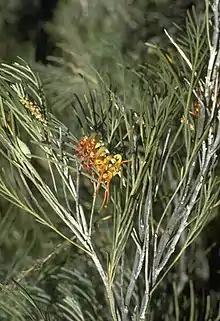| Cape Arid grevillea | |
|---|---|
 | |
| Scientific classification | |
| Kingdom: | Plantae |
| Clade: | Tracheophytes |
| Clade: | Angiosperms |
| Clade: | Eudicots |
| Order: | Proteales |
| Family: | Proteaceae |
| Genus: | Grevillea |
| Species: | G. baxteri |
| Binomial name | |
| Grevillea baxteri | |
Grevillea baxteri, commonly known as the Cape Arid grevillea,[1] is a flowering plant of the family Proteaceae and is endemic to the south-west of Western Australia. It is an erect to spreading shrub with pinnatipartite leaves and greenish to fawn or creamy-orange flowers.
Description
Grevillea baxteri is an erect to spreading shrub that typically grows to a height of 0.8–3.6 m (2 ft 7 in – 11 ft 10 in). Its leaves are pinnatipartite with seven to fifteen linear lobes, the ultimate lobes 40–80 mm (1.6–3.1 in) long and 1.0–1.5 mm (0.039–0.059 in) wide with the edges rolled under. The flowers are greenish to fawn or creamy orange, on a rachis 4–85 mm (0.16–3.35 in) long and covered with silky or felty hairs. The pistil is 22–25 mm (0.87–0.98 in) long, and the style is hairy. Flowering occurs in most months with a peak from July to November and the fruit is a follicle 14.0–15.5 mm (0.55–0.61 in) long.[3]
Taxonomy
Grevillea baxteri was first formally described in 1810 by Robert Brown in his Supplementum primum prodromi florae Novae Hollandiae.[4][5] The specific epithet (baxteri) honours William Baxter.[6]
Distribution and habitat
Cape Arid grevillea grows on sandplains in heath and mallee from near Scaddan to Israelite Bay in the Esperance Plains and Mallee biogeographic regions of south-western Western Australia.[1][3]
Conservation status
This grevillea is listed as "Priority Four" by the Government of Western Australia Department of Biodiversity, Conservation and Attractions,[1] meaning that is rare or near threatened.[7] It is also listed as Least Concern by the International Union for Conservation of Nature. Although it has a restricted distribution and is considered uncommon or rare, its population is believed to be stable, its occurrence is mostly within protected areas and there are no currently known threats to the population.[2]
References
- 1 2 3 4 "Grevillea baxteri". FloraBase. Western Australian Government Department of Biodiversity, Conservation and Attractions.
- 1 2 Keighery, G.; Makinson, R.; Monks, L. (2020). "Grevillea baxteri". IUCN Red List of Threatened Species. 2020: e.T112647083A113307696. doi:10.2305/IUCN.UK.2020-2.RLTS.T112647083A113307696.en. Retrieved 21 December 2023.
- 1 2 Makinson, Robert O. "Grevillea baxteri". Australian Biological Resources Study, Department of Agriculture, Water and the Environment: Canberra. Retrieved 3 January 2022.
- ↑ "Grevillea baxteri". APNI. Retrieved 3 January 2022.
- ↑ Brown, Robert (1830). Supplementum primum prodromi florae Novae Hollandiae. London. p. 22. Retrieved 3 January 2022.
- ↑ Sharr, Francis Aubi; George, Alex (2019). Western Australian Plant Names and Their Meanings (3rd ed.). Kardinya, WA: Four Gables Press. p. 144. ISBN 9780958034180.
- ↑ "Conservation codes for Western Australian Flora and Fauna" (PDF). Government of Western Australia Department of Parks and Wildlife. Retrieved 3 January 2022.

